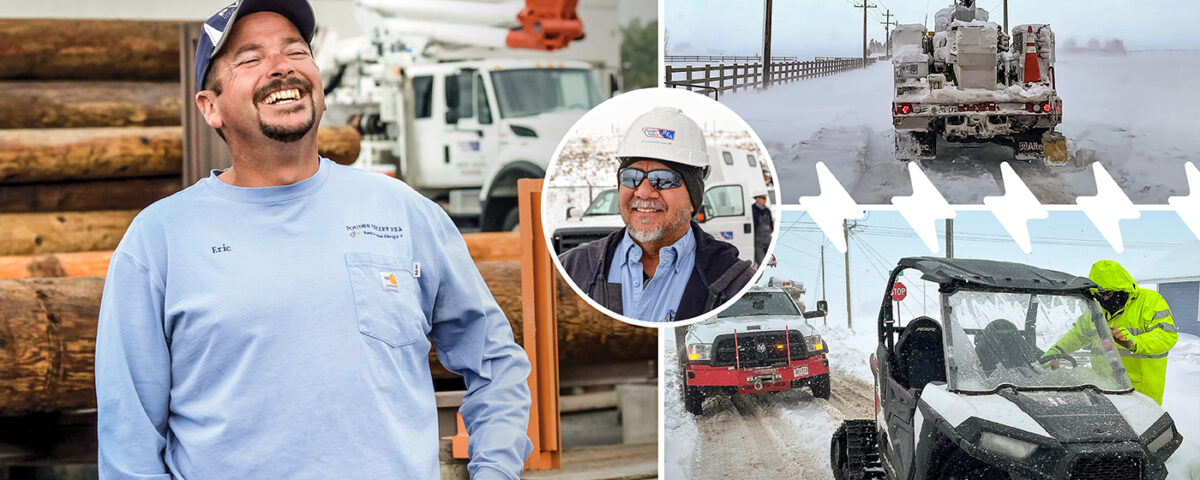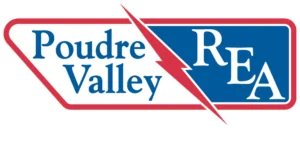They’re the ones who go out when it’s in the negatives and snow is pouring down. They’re the ones who travel through the mountains to find a downed power line.
They’re the ones who make sure the lights stay on and your home stays heated.
Lineworkers are a dedicated group of men and women who have a passion for all things power. From their early beginnings in line school to working while learning in an apprenticeship to reaching new heights in new roles, Poudre Valley REA lineworkers and lineworkers throughout the nation find their passion in exciting projects and keeping the power running for members throughout the country. Be sure to keep up with our socials as we celebrate national Lineman Appreciation Day this April 18!
In anticipation of lineman appreciation day, we wanted to talk with some of our current and past linemen and ask them how they got into the profession, what it means to be a lineman, and what is available to those who decide to move beyond working in the field.
A Career As A Lineman
What brings people to the profession? And what makes them enjoy the day-to-day of being a lineman?
Well, some have come from a community of linemen — fathers, uncles, family friends. Surrounded by those in the profession, it’s easy to see why they would look up to these prominent figures in their lives.
“It’s cool to be able to figure out equipment, build transformers, and turn the lights back on for our members,” Morgan Fogg, journeyman lineman, said. “Lots of family friends worked in the field, and it made me want to try it.”
Others knew they liked working with their hands or were just looking for a change of pace.
“It’s a good, clean career,” Ben Ludington, VP of Safety and HR, and former lineman, said. “It’s an opportunity to be outside, work with your hands, and do something that is rewarding.”
Regardless if they became lineworkers by plan or happen chance, those who find themselves in this rewarding profession do so because they have a love for working with their hands in scenic areas, solving new and complex problems, and turning the power back on for members.
Lineworkers are a tightknit group, with the bonds of brotherhood formed while working tough situations, like during extended outages or after-hours calls, The ability to work as a well-oiled machine comes from knowing that you’re surrounded by others who are working safely, diligently, and passionately to ensure every component of a job is being paid attention to.
Lineworkers enjoy ample benefits, competitive pay, a pension & 401k plan, comprehensive health and dental care, and much more. And the skills learned on the job are something that stays with you forever.
Getting started as a lineworker can be quite straightforward. With just a high school diploma, you can apply for line school to learn the skills you need. Schools in the area include the Trinidad State Rocky Mountain Line Technician program, Western Colorado Community College lineworker program, and others. You can even go out of state for line school and bring the skills back to Colorado.
Once you complete the courses, you can start an internship where you’ll be paid while you work and learn. After four years of apprenticeship, you’ll officially be a lineworker.
Linemen are a sought-after commodity — because wherever you go, people are going to need power. The skillset acquired at one cooperative can typically be transferred to any of the other 900+ electric co-ops across the nation.
But what if one day you wake up and say: “Hey, let’s do something new.” Fret not — the skills are also important in a variety of places as ‘indoor’ jobs. Safety, energy resources, operations, and more take what linemen have learned from their time in the field and can be utilized to make work better for crews. Having insight into day-to-day processes and years of in-the-field experience are valuable insights into what can be improved or valuable information that can be passed on to fellow team members or members.
How To Start Your New Career
If you’re someone who likes to work with their hands, enjoys being outdoors, and wants the satisfaction of being an integral part of their community, then a career as a lineworker may be right for you.
After a short bout in line school, apprentice lineworkers can learn while they work, making money while completing their apprenticeship program. Once the apprenticeship is complete, there’s a myriad of ways to grow within a company and the skill set is transferrable, as wherever there is power, lineworkers are needed.
If you’re interested in learning more, reach out to us at communications@pvrea.coop, come talk to us at events, or follow our LinkedIn to stay updated on job listings.

